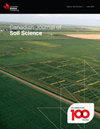加拿大农田非生长季节与生长季节N2O排放量的比率:国家清单方法的更新
IF 1.5
4区 农林科学
Q4 SOIL SCIENCE
引用次数: 2
摘要
摘要加拿大农业一氧化二氮(N2O)排放的国家清单报告主要基于使用静态室获得的测量结果。在冬季寒冷、积雪堆积的地区(包括加拿大),这些测量往往集中在生长季节(通常为5月至10月)。然而,研究表明,在整个非生长季节(NGS),排放量仍在继续,这些排放量在年排放量中占很大比例。在加拿大国家清单中,目前假设加拿大西部充分捕获了NGS排放量,而加拿大东部则通过将生长季节的排放量乘以1.4的修正系数来计算,该修正系数是基于有限数量的测量得出的。在这里,我们使用加拿大最近的研究来验证这个校正因子。我们从加拿大现有的研究中收集了数据,这些研究测量了农业系统全年的土壤N2O排放量,并确定了NGS期间这些排放量的比例。NGS期间发生的年N2O排放比例变化很大,从−4%到119%不等,平均为35.5%,而之前的估计为30%。由于高度可变性,在与气候、土壤和管理变量相关的平均值之间几乎没有观察到差异。为了校正加拿大农业土壤的NGS N2O排放量,我们建议将当前将生长季节转换为年总排放量的校正系数从1.4改为1.55,并将其用于加拿大的所有农业土壤,而不仅仅是加拿大东部。本文章由计算机程序翻译,如有差异,请以英文原文为准。
Ratio of non-growing season to growing season N2O emissions in Canadian croplands: an update to national inventory methodology
Abstract National inventory reporting of agricultural nitrous oxide (N2O) emissions in Canada is based primarily on measurements obtained using static chambers. In regions with cold winters and an accumulated snowpack (including Canada), these measurements tend to focus on the growing season (typically May–October). However, research has shown that emissions continue throughout the non-growing season (NGS) and that these account for a significant proportion of annual emissions. In the Canadian National Inventory NGS emissions currently are assumed to be adequately captured in western Canada, while they are accounted for in eastern Canada by multiplying the growing season emissions by a correction factor of 1.4, a value that was derived based on a limited number of measurements. Here we use recent Canadian studies to validate this correction factor. We collected data from available Canadian studies that measured soil N2O emissions from agricultural systems for the entire year and determined the proportion of these emissions that occurred during the NGS. The proportion of annual N2O emissions that occurred during the NGS varied widely, ranging from −4% to 119% with a mean of 35.5%, compared to the previous estimate of 30%. Due to high variability, few differences were observed between means associated with climatic, soil, and management variables. To correct for NGS N2O emissions from Canadian agricultural soils, we suggest that the current correction factor for converting growing season to total annual emissions be changed from 1.4 to 1.55 and that this be used for all agricultural soils in Canada rather than just eastern Canada.
求助全文
通过发布文献求助,成功后即可免费获取论文全文。
去求助
来源期刊

Canadian Journal of Soil Science
农林科学-土壤科学
CiteScore
2.90
自引率
11.80%
发文量
73
审稿时长
6.0 months
期刊介绍:
The Canadian Journal of Soil Science is an international peer-reviewed journal published in cooperation with the Canadian Society of Soil Science. The journal publishes original research on the use, management, structure and development of soils and draws from the disciplines of soil science, agrometeorology, ecology, agricultural engineering, environmental science, hydrology, forestry, geology, geography and climatology. Research is published in a number of topic sections including: agrometeorology; ecology, biological processes and plant interactions; composition and chemical processes; physical processes and interfaces; genesis, landscape processes and relationships; contamination and environmental stewardship; and management for agricultural, forestry and urban uses.
 求助内容:
求助内容: 应助结果提醒方式:
应助结果提醒方式:


